Review for Paniponi Dash: Volume 6 - Chaos Cum Laude
Introduction
Comedy is supposed to be fun, it's supposed to be entertaining, cheering, relaxing. It certainly isn't supposed to be a chore, but when you wind up reviewing six comedy anime discs in a row, you can't get away from a certain weariness from the exercise. This is the final disc of Paniponi Dash, and much as I have enjoyed the surreal hijinks and random comedy mayhem, I can't help but slightly resent the notepad I've had next to me, reminding me that I'll have to write about the comic effect the next day. Fortunately, I'll have none of this problem the second time I watch the show, although whether the experience has been soured for me is yet to be seen. How much of my lukewarm response to Paniponi Dash is reviewer-clouded perception, and how much is genuine is unclear to me at this point, but it does have one final volume to go out with a bang. Will it finally nudge above the 7 out of 10 barrier?
Rebecca Miyamoto is an MIT graduate who is returning to Japan to teach at Momotsuki (Peach Moon) Academy. She'll be the homeroom teacher to class 1-C, and to keep her company, she has her melancholy toy rabbit, Mesousa. The only problem is that she's only eleven years old. Well that's not the only problem. The school is zany weird, her class is full of weirdoes that keep making her cry, and all the while, an alien spaceship watches from orbit, determining the future of the human race depending on how Becky performs. And while the class may be thrilled to have a genuine omega cute mascot of a schoolteacher, Becky's prone to tantrums, foul mouthed tirades and sheer obnoxiousness.
Volume 6 of Paniponi Dash from ADV comes with some extras, and four episodes with which the series concludes. First the end of the world is nigh, but no one seems to care as it's so fricken cold, and Becky's playing with a puppet theatre; Suddenly class 1-C is transported to the Edo era, where tax inspector extraordinaire Becki-mon Miyamoto has introduced a new hau-hau tax; The end of the world is still nigh, and it's still too cold for class 1-C to act. Typical students, you need to bribe them with free food first; And to top things off, after the cold comes the heat, intense, soul-sapping heat. It's about time Paniponi Dash had a swimsuit episode.
Picture
It's a Region 1 disc, so as you would expect Paniponi Dash gets a 1.78:1 anamorphic transfer in the NTSC format. You have a lower resolution, and with it an imperceptible flicker to deal with (for some people), but you get to live without the conversion artefacts like ghosting, softness, and judder. Paniponi Dash is a visual explosion of a show, and having seen Shaft productions like Moonphase, Negima!? and Natsu no Arashi, that's really saying something. The character designs may be simplistic, but surreal is the order of the day with the animation. Anything goes, the screen is always filled with visual gags, the school blackboard offers countless opportunities for humorous graffiti (translated by the captions, explained by the Vid-notes), and breaking the fourth wall is the order of the day. The school is often portrayed as a television studio (on occasion a member of the crew wanders on set in the middle of the take, then hurriedly sneaks off again). It's also replete with pop culture references and winks to the audience. It's a frenzy of a show that makes you glad for the invention of the pause button, just so you can take it all in.
Sound
You have a choice between DD 5.1 English and DD 2.0 Japanese. As for subtitle tracks, you have minimal signs, full signs, optional translated subtitles with minimal signs, optional translated subtitles with full signs, oh, and the AD Vid-notes tracks as well. The difference between the minimal and full signs is that more of the background blackboard gags get translated, and some people may not want the extra distraction from what's happening in the foreground. Also, the vid-notes come with a popping sound, so that means the audio tracks are here in duplicate (with added pops).
I went for the Japanese track, and as usual was happy enough with that, with some interesting character voices livening up the show. As for the English dub, I survived about 10 minutes of it. Taking a leaf from Excel Saga, ADV's approach to Japanese anime comedy is to make it as loud as possible, which quickly gets annoying. Also a 5.1 surround track is a tad overkill for what's really just a simple comedy show.
Extras
The disc comes in an Amaray case, and the sleeve has the 4-panel manga from the episode previews printed inside so that you can read them at your leisure.
Inside you'll also find an 8-page booklet, which has a choose your own adventure Mesousa game book (although you'll find the final solutions on disc). There is also a separate single page insert with an interview with the manga creator Hekiru Hikawa
You will be glad to see the return of the AD Vid-notes feature, especially with this gag rich title. The AD Vid-notes are those little subtitle pop-ups that appear to explain and translate cultural specific gags, point out odd references, little bits of trivia, just so that you don't miss any of the jokes.
Also on this disc are all four textless closing sequences, a clean opening sequence, the Chalkboard Champions (see disc 1) results, and the 'choose your own Mesousa adventure' endings.
The previews on this disc include Welcome to the NHK, Jing, King of Bandits: Seventh Heaven, Pumpkin Scissors, Slayers OVA Collection, 5 Centimeters per Second, and Yugo the Negotiator.
Conclusion
Well, the final volume of Paniponi Dash didn't disappoint, but on the other hand, it didn't exactly hit the ball out of the park either. In fact, it was more of the same random gag comedy that has so typified the earlier volumes, with the added knowledge that since the end of the series was impending, the humour could be even more random and surreal than before. It's great if you love that sort of humour, but for anyone looking for a little more from a comedy series, this really isn't the place to begin your search.
Not that there is much story to tell in these episodes, but what there is points to the end of the world. A cometary impact is imminent, with a whole host of other calamities and ill omens preceding it, and the focus is on Becky and her students trying to find a way to avoid doing anything about it. This goes on for a whole episode before the school principal shows up with an offer that they can't refuse, at which point they launch into space in a giant robot pop culture reference, and find new ways to dither about saving the world. And all through this adventure, more and more surreal things happen. It's broken up with perhaps the best episode on the disc, and maybe even the best in the series, when the cast of the show are transplanted back into the Edo era, complete with Shogunate officials, samurai and ninja, and Becky gets to be a tax inspector. It's completely out of the blue and unexpected as an episode, but since it obeys its own inner logic, and has something approaching a conventional narrative flow, it does satisfy me more.
The final episode in the series fulfils the fan service requirement that any show with a cast of teenage girls has to fulfil at some point in the run. The temperature is hot, a swim park magically appears on the school grounds, and the girls all get into their swimming costumes. Random comedy occurs thereafter. And you remember the aliens? Over the course of this volume, they gradually morph into the crew of the Starship Enterprise…
Paniponi Dash is funny, I do laugh at it, and I am entertained. But there is that annoying sketch show format, the tendency to throw everything in the arsenal at the screen (then fill the remaining space with hopefully humorous blackboard scrawls), and pray that something sticks. Sometimes it works, but sometimes it's just overkill. For those who crave the random and bizarre to tickle their funny bone, this is ideal. It's relentless and varied, and dense with gags, in-jokes, pop culture references, and slapstick. I find however that I prefer comedy with more character behind it, more derived from the situation than from the freewheeling imagination of a gagsmith. I watched the final two episodes of Paniponi Dash last night, and I laughed and giggled and chuckled as I was supposed to no doubt. But then I watched the first episode of Planetes, which in no way can be categorised as a pure comedy. Yet I laughed more at that, than I did at Paniponi Dash. Make of that what you will.
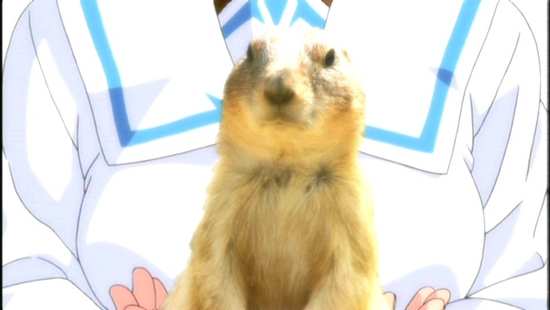
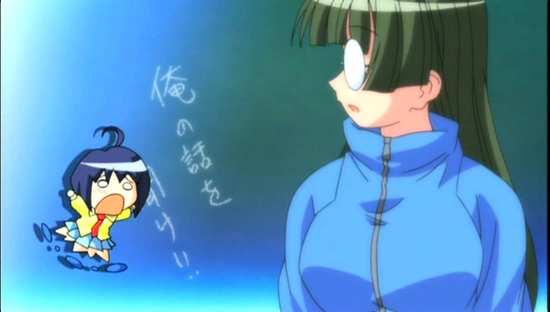
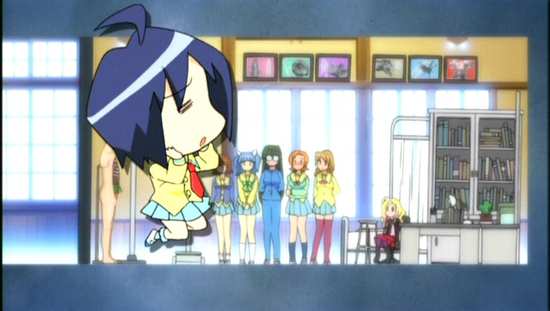
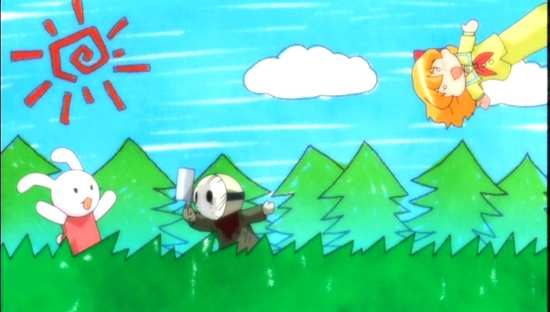
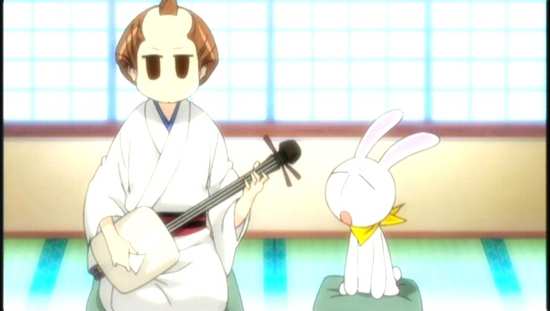
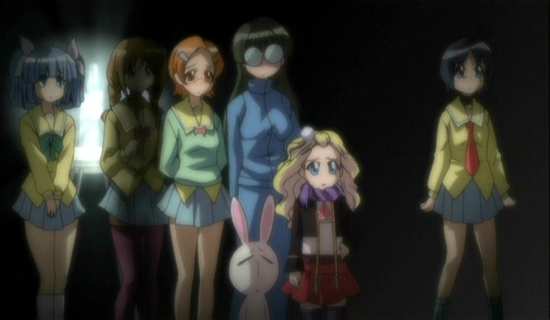
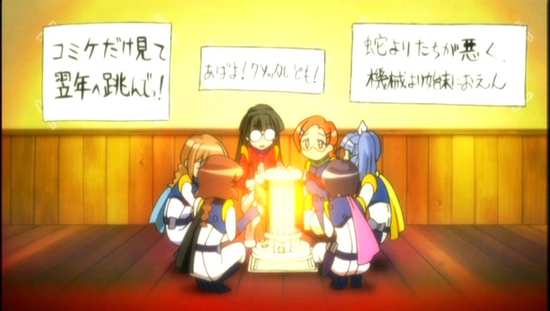
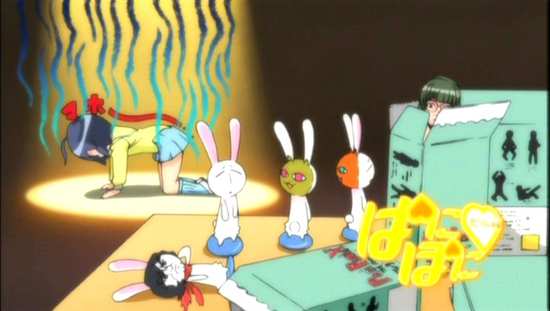
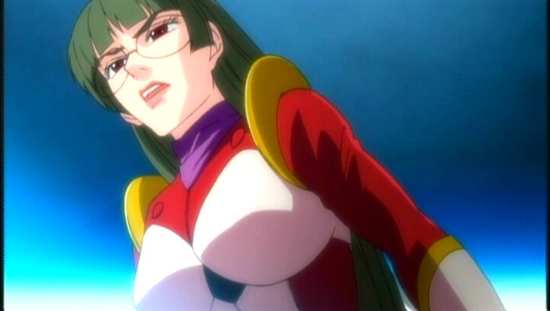
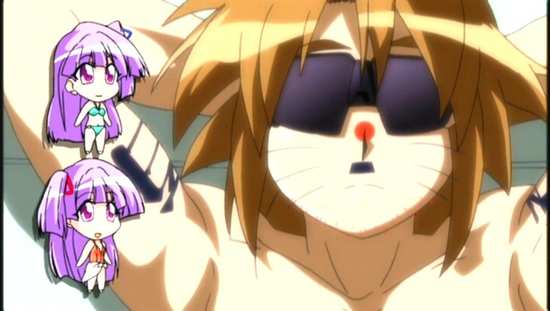
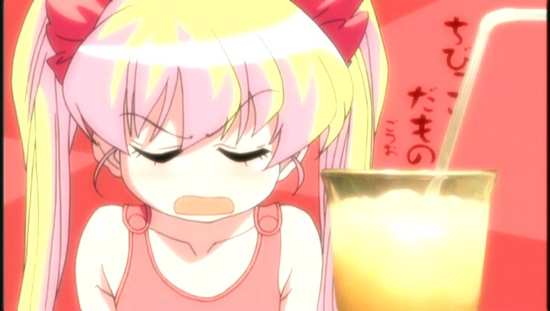
Your Opinions and Comments
Be the first to post a comment!